Can Cryptocurrency Be Taxed?
Author: ChatGPT
February 25, 2023
Introduction
Cryptocurrency has become a popular form of digital currency in recent years, and with its increasing popularity, many people are wondering if it can be taxed. The answer is yes, cryptocurrency can be taxed, but the process is a bit more complicated than traditional taxes. In this blog post, we will discuss the basics of cryptocurrency taxation and how you can ensure that you are compliant with the law.
What Is Cryptocurrency?
Cryptocurrency is a digital or virtual currency that uses cryptography for security. It is not issued by any government or central bank and operates independently of any central authority. Cryptocurrencies are decentralized and operate on a peer-to-peer network, meaning that transactions take place directly between two parties without the need for an intermediary such as a bank or other financial institution. Bitcoin is the most well-known cryptocurrency, but there are many others such as Ethereum, Litecoin, and Ripple.
How Is Cryptocurrency Taxed?
The taxation of cryptocurrency depends on how it is used and what type of transaction it is involved in. Generally speaking, if you use cryptocurrency to purchase goods or services then it will be subject to capital gains tax just like any other asset. If you receive cryptocurrency as payment for goods or services then it will be subject to income tax just like any other form of income. If you trade one type of cryptocurrency for another then this will also be subject to capital gains tax.
In addition to these taxes, some countries may also impose additional taxes on certain types of transactions involving cryptocurrencies such as VAT (value added tax) or GST (goods and services tax). It’s important to check with your local tax authority to make sure that you are aware of all applicable taxes in your jurisdiction before engaging in any type of transaction involving cryptocurrencies.
What Are The Risks Of Not Paying Taxes On Cryptocurrency?
Not paying taxes on cryptocurrency can have serious consequences including fines and even jail time depending on the severity of the offense. In addition to this, not paying taxes on cryptocurrency can also lead to an audit by the IRS which could result in additional penalties if they find that you have not reported all taxable income from your crypto transactions. It’s important to remember that even though cryptocurrencies are decentralized and operate independently from governments and banks, they still must comply with applicable laws just like any other asset class.

Conclusion
Cryptocurrency can indeed be taxed just like any other asset class but it’s important to understand how different types of transactions involving cryptocurrencies are taxed in order to ensure compliance with applicable laws. It’s also important to remember that failure to pay taxes on crypto transactions can lead to serious consequences so make sure that you consult with a qualified accountant before engaging in any type of transaction involving cryptocurrencies so that you can ensure compliance with all applicable laws and regulations.


How Long Does It Take To Sell Stock And Get Money?
Discover the answer to one of the most frequently asked questions in the world of finance - learn how long it takes to sell stock and receive your earnings.

What Are High Dividend Stocks?
Discover how investing in high dividend stocks can potentially provide a steady income stream and increase your long-term returns in the stock market.

Are Data Science And Machine Learning The Same?
Data science is a field of study that focuses on extracting insights from large amounts of data. It involves using various techniques such as machine learning, natural language processing, statistics, and data mining to analyze data sets and uncover patterns or trends.

Are Remarkable Tablets Worth It?
Are you looking for a device that can replace your notebooks and printed documents? If so, you may have heard of the reMarkable 2 tablet.
